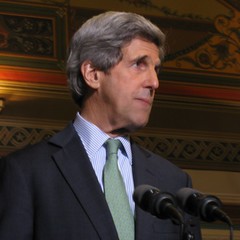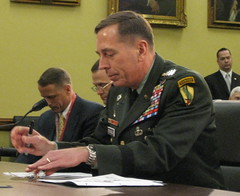Thursday
Jun112009
Petraeus: Beating Terrorists Requires More Than Counterterrorist Operations
By Celia Canon- Talk Radio News Service
General David Petraeus, Commander of the United States Central Command, warned that military missions against terrorist groups are comprehensive and require more than force.
“Countering terrorism requires more than counter-terrorist operations,” said Petraeus today in a speech to the Center of a New American Security. The General went on to discuss the implications of shifting military attention from Iraq to Afghanistan and Pakistan and how the U.S.’ experience in Iraq should optimize the efficiency of military operations in other countries.
“As we turn and shift our focus to Afghanistan and Pakistan it is very important to reflect on what we learned from Iraq and to remember that you have to apply what was learned there with a very nuanced understanding...of local circumstances,” said Petraeus.
Petraeus was one of the leading figures during the 2007 surge of U.S. troops in Iraq, a move that increased U.S. military capability in the Middle East by more than 20,000 soldiers and additional brigades. The surge was instrumental in the counterinsurgency mission that would help secure the region. Petraeus completed his work in Iraq by rebuilding the Iraqi army.
Petraeus highlighted the success of the U.S. army in improving security conditions, stating “We’ve gone from a situation in which June of 2006 or 2007 saw 160 attacks per day on average. in Iraq it is now between 10 and 15 attacks per day and has been that way for about 6 months now; in fact in the low end of that in recent weeks.”
However, Petraeus did concede that last month was an exception. There were over 400 attacks in May, the highest in the country’s post-invasion history.
The General touched upon the peacekeeping role that the army has recently acquired with the Iraq mission and named the safety of the civilian population as a major priority.
“The overriding mission of a military force in counterinsurgency has to be to secure the people and...be seen as securing and serving them. This is hugely important,” said Petraeus.
Petraeus explained that once security has been established throughout the country, the U.S. would not be able to leave Afghanistan until they have assured that the established government follows a peace-ensuring criteria.
General David Petraeus, Commander of the United States Central Command, warned that military missions against terrorist groups are comprehensive and require more than force.
“Countering terrorism requires more than counter-terrorist operations,” said Petraeus today in a speech to the Center of a New American Security. The General went on to discuss the implications of shifting military attention from Iraq to Afghanistan and Pakistan and how the U.S.’ experience in Iraq should optimize the efficiency of military operations in other countries.
“As we turn and shift our focus to Afghanistan and Pakistan it is very important to reflect on what we learned from Iraq and to remember that you have to apply what was learned there with a very nuanced understanding...of local circumstances,” said Petraeus.
Petraeus was one of the leading figures during the 2007 surge of U.S. troops in Iraq, a move that increased U.S. military capability in the Middle East by more than 20,000 soldiers and additional brigades. The surge was instrumental in the counterinsurgency mission that would help secure the region. Petraeus completed his work in Iraq by rebuilding the Iraqi army.
Petraeus highlighted the success of the U.S. army in improving security conditions, stating “We’ve gone from a situation in which June of 2006 or 2007 saw 160 attacks per day on average. in Iraq it is now between 10 and 15 attacks per day and has been that way for about 6 months now; in fact in the low end of that in recent weeks.”
However, Petraeus did concede that last month was an exception. There were over 400 attacks in May, the highest in the country’s post-invasion history.
The General touched upon the peacekeeping role that the army has recently acquired with the Iraq mission and named the safety of the civilian population as a major priority.
“The overriding mission of a military force in counterinsurgency has to be to secure the people and...be seen as securing and serving them. This is hugely important,” said Petraeus.
Petraeus explained that once security has been established throughout the country, the U.S. would not be able to leave Afghanistan until they have assured that the established government follows a peace-ensuring criteria.
tagged  2007,
2007,  Afghanstan,
Afghanstan,  Ambassador Crocker,
Ambassador Crocker,  General David Petraeus,
General David Petraeus,  Iraq,
Iraq,  President Barack Obama,
President Barack Obama,  Prime Minister Zarkai,
Prime Minister Zarkai,  US Central Command,
US Central Command,  USCENTCOM,
USCENTCOM,  civilians,
civilians,  counterinsurgency,
counterinsurgency,  counterterrorism,
counterterrorism,  insurgents,
insurgents,  military operations,
military operations,  pakistan,
pakistan,  peacekeeping,
peacekeeping,  priority,
priority,  safety,
safety,  security,
security,  security forces,
security forces,  terrorism,
terrorism,  terrorists,
terrorists,  the surge in
the surge in  Frontpage 1
Frontpage 1
 2007,
2007,  Afghanstan,
Afghanstan,  Ambassador Crocker,
Ambassador Crocker,  General David Petraeus,
General David Petraeus,  Iraq,
Iraq,  President Barack Obama,
President Barack Obama,  Prime Minister Zarkai,
Prime Minister Zarkai,  US Central Command,
US Central Command,  USCENTCOM,
USCENTCOM,  civilians,
civilians,  counterinsurgency,
counterinsurgency,  counterterrorism,
counterterrorism,  insurgents,
insurgents,  military operations,
military operations,  pakistan,
pakistan,  peacekeeping,
peacekeeping,  priority,
priority,  safety,
safety,  security,
security,  security forces,
security forces,  terrorism,
terrorism,  terrorists,
terrorists,  the surge in
the surge in  Frontpage 1
Frontpage 1 





Former Minister: Afghan Police Only Way To Victory In Afghanistan
As Iraqi security has improved, the situation security in Afghanistan has become increasingly unstable. The Obama Administration recently pledged to increase the amount of soldiers stationed in Afghanistan by 30,000, but critics claim that the only way to improve Afghan security is by cultivating the security forces themselves, not by adding more American soldiers.
Today, the United States Institute for Peace stated some of their alternative policies because they believe that a surge will inevitably fail.
One of the main problems with the Afghan police force presently, according to Ali Jalali, the Interior Minister of Afghanistan from 2003 to 2005, is that the public does not trust the police. He cited an example where Afghan police officers at a checkpoint were armed only with rocket-propelled grenades, which intimidated the public. “Police is not only to protect people, but also they are responsible to protect the population and the rule of law,” he said.
The Afghani police system established after 2001 was ineffective because the financial resources were not given, and their role as protectors of the law mixed with the need to stop insurgents, Jalali said, adding that when the army and police have common goals, neither institution does their job effectively.
“Police should fight crime,” Jalali said. He would like to see police divided into two groups - traditional police and paramilitary police. Traditional police would patrol the streets and enforce the rule of law, whereas paramilitary police would patrol the borders and aid in fighting terrorists, he said.
Afghan security forces also suffer from a lack of training. Karen Hall, the Afghanistan Police Program Manager for the U.S. State Department, said that 75 percent of the Afghan military is illiterate.
“How can a police officer function if they can not fill out a police report, if they can’t effectively communicate to prosecutors what crimes an individual committed,” said Hall.
The casualty rate for Afghan police is three times as high as the Afghan military. Hall believes that this is the direct result of ineffective training mixed with a dramatic lack of funding during the beginning of the war in 2002. Afghan security forces received less than $1 billion dollars from the U.S., from to 2002 to 2005, the Afghan military received more than $16 billion per year.
Both Jelali and Hall agreed that the only way for at true victory in Afghanistan is dependent on how well the Afghan security forces can patrol their own nation. But the coalition forces have only deemed 12 of the 40 districts in Afghanistan independent and safe, Hall said.